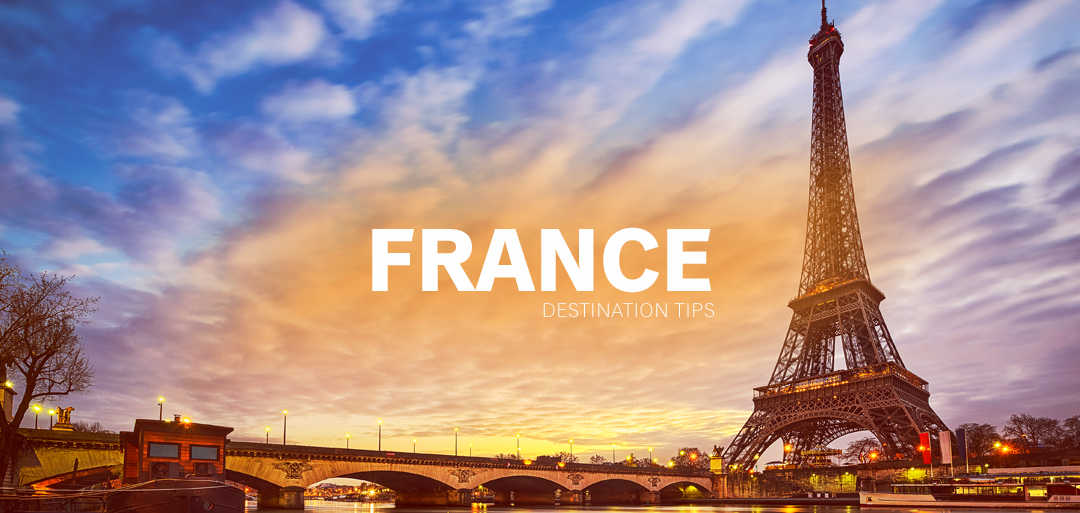From the illustrious Eiffel Tower, to the majestic palace of Versailles, to the somber battlefields of Normandy, there’s so much to see and explore when you travel to France.
In order to truly make the most of your trip, though, it’s best to be prepared. Knowing what to expect in France can help you avoid some of the little stresses that go along with travel and spend more time on what you came for: life-changing experiences.
Here are some tips for making sure you’re ready for your trip to France:
What do I need to know about France?
President: Emmanuel Macron
Prime Minister: Édouard Philippe
Religion: Christian (51%), No religion (40%), Other (9%)
Date format: DD/MM/YYYY
Time zone: Central European Time (EST+6)
What do I need to know about French culture?
Language: The official language of France is — you guessed it — French. If you’re learning French, then this is a golden opportunity to practice. It’s okay, though, if you have no knowledge of the language — people will mostly speak English in more touristy areas, and tour guides will help you navigate. Here are some French phrases that might be helpful for you to learn before you go.
Etiquette: The French are keen on politeness — though they have a reputation for being stuffy and rude, this really stems from a strict emphasis on etiquette. Always say please and thank you. Be sure to use vous when speaking to someone older than you, or when speaking to strangers, and add on monsieur or madame. Handshakes are common greetings, though with friends, it’s common to kiss cheeks, though the number of kisses depends on the region.
Holidays: If your trip happens to fall during a holiday, this can be an excellent way to interact with locals during your free time, though it may affect business hours for shops and sites. Check out a calendar of French holidays to see if any of them overlap with your trip dates.
If you happen to be traveling on July 14, you’re in for a real treat: This is Bastille Day, which commemorates the storming of the Bastille in 1789. Every year, Parisians celebrate with a Bastille Day Military Parade in the morning, and at night firework shows abound throughout the rest of the country.
What about health and safety?
Safety: As of this post, the U.S. State Department has listed France as Level 2, the second-lowest level of caution. Travelers are encouraged to “Exercise increased caution.” That means keeping an eye on your luggage and wallet, staying with your group if you’re with a tour, and generally being aware of your surroundings.
The French drive on the right, so you don’t have to worry about looking the wrong way before crossing the street.
Health: You do not need to have any vaccines to travel to France, and the tap water is safe to drink.
Weather: France’s climate varies depending on where you go within the country. Western France is cool and rainy in the summer, eastern France is warmer but with plenty of rainfall, and the south of France has warm summers with little rainfall.
Check out the weather before you go, and prepare with clothes for cool weather and rain.
Food: France is famous for its cheese, so expect to see plenty of it. French cuisine also includes plenty of butter or olive oil, plus vegetables and various meats, but recipes vary by region. Because of the meat-heavy cuisine, it isn’t the most vegetarian-friendly country, but in mainstream restaurants in popular tourists destinations like Paris, finding veggie cuisine shouldn’t be too difficult.
How do I use my phone in France?
International calling and WiFi: The number to call for emergency services is 112. To call the U.S. from France, dial 001 and then the number, starting with the area code. Most hotels will offer WiFi.
For information on how international calling works for your cellular provider, contact them directly.
Adaptors: France uses a different plug than the U.S., so you will need an adaptor. Be sure to purchase one so you are able to charge your phone abroad.
What do I need to get in, out, and around France?
Passport and visa: Your passport must be valid for three months following your date of departure from France. Visas are not required if you are staying for less than 90 days.
Customs: Don’t try to bring any raw beans, or fruits or vegetables back into the U.S.
Money: France uses the Euro (€), the official currency of the European Union. Other types of paper currency won’t be accepted, though credit cards from the U.S. are fine. Check with your bank to see if you’ll be charged a fee for using your card abroad, and definitely notify them of your tour dates.
Check out the exchange rate for USD to Euros before you go, and if you decide to change money, make sure the rate is favorable. Usually, the airport currency exchange will not offer you the best rate, and you’re best off using a debit card at an ATM during your trip, but be aware of any international fees.
Also, be sure to check out our tips and guidelines for spending money abroad.
Packing essentials for France
- Passport
- Raincoat
- Umbrella
Are you a teacher who is interested in taking students along for the ride? Explorica takes care of all of the little details so you can focus on making your trip to France educational and fun. Plan a trip to France today!

